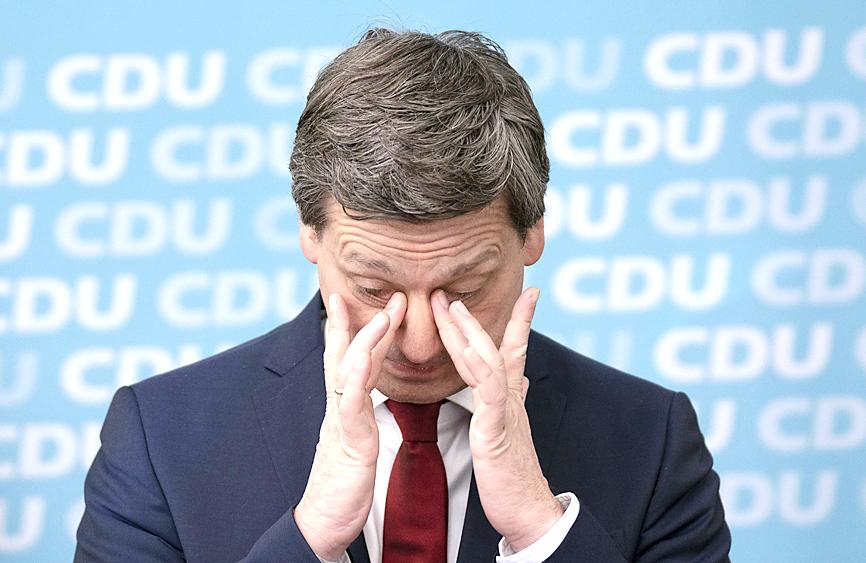German Chancellor Angela Merkel’s party was in crisis mode on Monday after experiencing heavy losses in two regional polls, seen as a rebuke of its pandemic management six months before a general election.
Merkel’s center-right Christian Democratic Union (CDU) scored its worst-ever results in elections in the southwestern states of Baden-Wuerttemberg and Rhineland-Palatinate, estimates from public broadcasters showed.
Sunday’s rout raised questions about the conservatives’ chances in the Sept. 26 general election, when Germans are to choose a successor to outgoing leader Merkel.

Photo: AP
“It can’t go on like this,” said Der Spiegel weekly, adding that Merkel’s house was “on fire.”
The rout was blamed on growing public anger over a sluggish vaccine rollout, a delayed start to mass rapid testing and higher infection numbers, despite months of shutdowns.
In the days leading up to the regional votes, Merkel’s CDU and its sister party, Bavaria’s Christian Social Union (CSU), were also rocked by revelations of lawmakers apparently profiting from deals to procure masks in the early days of the COVID-19 pandemic.
Three conservative lawmakers have since resigned and the CDU-CSU alliance has forced all of its lawmakers to declare any financial gain from the virus crisis, vowing “zero tolerance.”
CSU secretary-general Markus Blume called Sunday’s drubbing a “wake-up call” for the alliance.
If Germany’s largest bloc wants to stay in power when Merkel bows out after 16 years, it urgently needs to “win back trust,” he said.
“We need clear decisions and a clear course in the fight against COVID-19,” he added.
The first order of business should be to decide the bloc’s candidate for chancellor, media outlet Spiegel said.
New CDU chairman Armin Laschet is the obvious choice, but he lacks broad support.
Critics say that he has failed to carve out a political profile beyond representing continuity in the post-Merkel era.
Laschet needs to “free himself from Merkel’s shadow” and “say what the party stands for,” Johannes Gutenberg University of Mainz historian and CDU member Andreas Roedder told the Bild daily.
Opinion polls suggest that Germans would prefer to see popular Bavarian premier and CSU chairman Markus Soeder in the top job, but he has yet to declare a willingness to run.
If Soeder genuinely has chancellor ambitions, “he must strike now,” the Handelsblatt financial daily said.
Merkel’s CDU garnered just 24 percent of the vote in the state of Baden-Wuerttemberg, down from 27 percent five years ago, estimates showed.
The state is an outlier in Germany because it has been run by Premier Winfried Kretschmann of the Green Party for more than a decade.
Kretschmann led the left-leaning ecologists to a record result of more than 32 percent.
The 72-year-old could opt to keep the coalition with the CDU, or build an alliance with the center-left Social Democrats (SPD) and the pro-business Free Democratic Party.
His choice is to be closely watched, as it could serve as a blueprint for the next national government.
Support for the Green Party has risen in recent years on growing concern about climate change and it could emerge as a kingmaker in September’s election.
In Rhineland-Palatinate, Premier Malu Dreyer powered the SPD to another victory, with a result of about 36 percent.
The CDU slumped to about 26 percent, down from almost 32 percent in 2016.
Dreyer is likely to keep her “traffic light” coalition with the Green Party and the Free Democratic Party, named after the parties’ colors.

Airlines in Australia, Hong Kong, India, Malaysia and Singapore yesterday canceled flights to and from the Indonesian island of Bali, after a nearby volcano catapulted an ash tower into the sky. Australia’s Jetstar, Qantas and Virgin Australia all grounded flights after Mount Lewotobi Laki-Laki on Flores island spewed a 9km tower a day earlier. Malaysia Airlines, AirAsia, India’s IndiGo and Singapore’s Scoot also listed flights as canceled. “Volcanic ash poses a significant threat to safe operations of the aircraft in the vicinity of volcanic clouds,” AirAsia said as it announced several cancelations. Multiple eruptions from the 1,703m twin-peaked volcano in

Farmer Liu Bingyong used to make a tidy profit selling milk but is now leaking cash — hit by a dairy sector crisis that embodies several of China’s economic woes. Milk is not a traditional mainstay of Chinese diets, but the Chinese government has long pushed people to drink more, citing its health benefits. The country has expanded its dairy production capacity and imported vast numbers of cattle in recent years as Beijing pursues food self-sufficiency. However, chronically low consumption has left the market sloshing with unwanted milk — driving down prices and pushing farmers to the brink — while

China has built a land-based prototype nuclear reactor for a large surface warship, in the clearest sign yet Beijing is advancing toward producing the nation’s first nuclear-powered aircraft carrier, according to a new analysis of satellite imagery and Chinese government documents provided to The Associated Press. There have long been rumors that China is planning to build a nuclear-powered aircraft carrier, but the research by the Middlebury Institute of International Studies in California is the first to confirm it is working on a nuclear-powered propulsion system for a carrier-sized surface warship. Why is China’s pursuit of nuclear-powered carriers significant? China’s navy is already

‘SIGNS OF ESCALATION’: Russian forces have been aiming to capture Ukraine’s eastern Donbas province and have been capturing new villages as they move toward Pokrovsk Ukrainian Commander-in-Chief Oleksandr Syrskyi on Saturday said that Ukraine faced increasing difficulties in its fight against Moscow’s invasion as Russian forces advance and North Korean troops prepare to join the Kremlin’s campaign. Syrskyi, relating comments he made to a top US general, said outnumbered Ukrainian forces faced Russian attacks in key sectors of the more than two-and-a-half-year-old war with Russia. Ukrainian President Volodymyr Zelenskiy in a nightly address said that Ukraine’s military command was focused on defending around the town of Kurakhove — a target of Russia’s advances along with Pokrovsk, a logistical hub to the north. He decried strikes